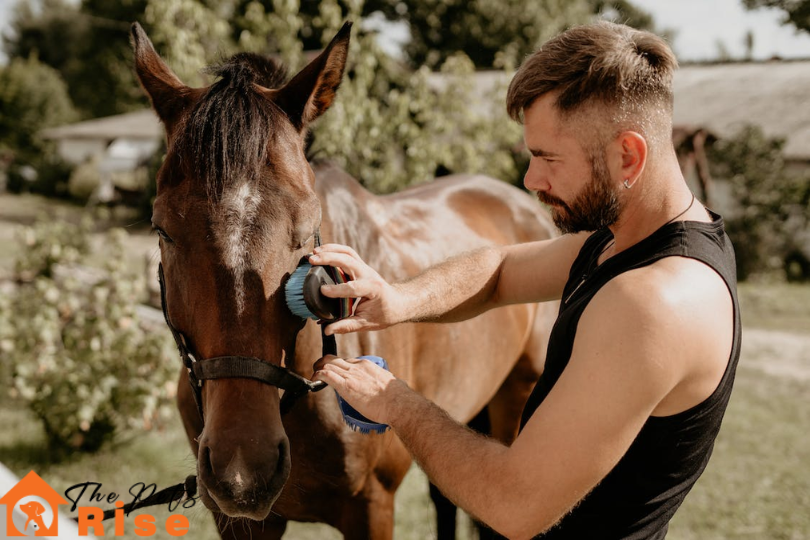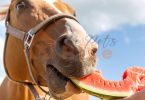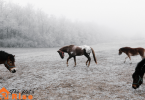How to take care of a horse is something that anyone who wants to own a horse as a pet should know for better care of an equine companion. You should familiarize yourself with the fundamentals of proper horse care before bringing your new equine buddy home. Understand how to shelter, feed, and take care of your horse or pony.
Find out what excellent health looks like, how pony care differs from horse care, and when to call the doctor. If you like your pony or stallion to look as dashing and cute as they are supposed to then follow these horse care tips that are just pet care tips for horses. Continue reading about how to take care of a horse.
Regular Grooming
Starting our horses care guide with grooming the horse. If you have seen ponies or any other cute horses that look cute, this is because of their overall grooming routine. Getting a horse may seem easier in several scenarios but once you get it, check the horse care guide to learn about the grooming of your horse. This should be your daily routine that is vastly beneficial to the animal. You should regularly remove dust, dirt, and mud from the animal’s body and take a look at any injuries on the body as well along with blisters and scratches.
With the regular grooming of your pet horse, you can find an improved circulation of blood and a sweat-free body. Also, this will boost the bonding between you and your pet horse. Mind the fact that your horse is a different animal and is a keen observer. He is an intelligent creature and will love your effort. However, keep in mind that horse grooming requires effort and time, and proper knowledge regarding how to care for a horse. You can take help from an expert or your friend who is an expert in it as well. Check out different pet care blogs or different horses care guide where you find horse care tips. Buy quality equipment for its grooming.
- Face brush
- Rubber comb
- Mane brush
- Body and dandy brush
- Sponge
- Hoof pick
When it comes to bathing, then don’t wash your horse daily. However, when he gets back from a muddy track or running on a rainy day then he will need a wash. When this happens, you should wash it with warm water and some mild shampoo. Don’t use direct shampoo on the horse’s face instead use a wet cloth to clean it.
Create Natural Bond
Horses, even though they have a rather friendly nature but they will let you touch or approach them before they know you. You will need to develop a certain level of trust before you take them to the track or for a walk. Bonding is part of caring for a horse so here are the things that you can do to create a natural bond.
Patience While Training
When it is your first time contacting a horse than show confidence and gentleness while touching. Go a little close to it but let it come close to you as well. Don’t rush while doing this. Be gentle and let the horse come close to you. He will sniff you first. If you act anything in a rush, he will turtle and take a step back. While he is sniffing you, offer him a small treat.
Once you make a connection with it, don’t rush in running or taking it to train. Instead, spend some time walking around. Sometimes you may have to wait for more than a week to see any progress. Take your time. Once he is comfortable with you, he will follow your commands and lead.
Gently Speak And Pet Your Horse
There is a reason why horses have been with humans for centuries. They are considered to be one of the smartest animals and it has been proven many times. They can read people, and their posture, body language, and voice tone and volume of your speech while talking to the animal. Considering this is a major part of learning about how to take care of a horse. While spending time with your horse, you should learn to control yourself.
You should develop gentle behavior and always speak calmly all the time with them. Such positivity is crucial for developing a bond between the horse and it plays an important role in its training. A calm nature is required to train the horse. Most of the horses will not mind human touch. You can learn that if your horse is fine with scratching, pats on the back, and simple massages. While spending time with them, talk gently with them and exchange tenderness.
Provide Quality Food And Water
How can you expect your horse to act healthy when it is actually not? The nutritional needs of a horse should be fulfilled as the very first step of learning how to care for a horse. Your animals should have clean hay and water nearby all the time. Despite its size, the stomach of a horse is delicate and small. This is why it has several periods of eating in small portions. They don’t have a regular two meals-a-day routine. Providing fresh hay is important but if you can’t then a combination of hay and grain is also an acceptable diet for them.
The diet of the horse heavily relies on the type of horse such as senior, foal, mare, or racehorse will have different meal routines and requirements due to their lifestyle and how they all have different physiological requirements. If you aren’t sure about this then consult an expert pet to make a diet plan for them. As per basic caring for a horse, you should provide hay that is fresh and does not have any odd smell or moldy. If you notice this then consider changing it without any delay to avoid any serious consequences.
Daily Exercise Is Good
If you own a pet dog then you already know that a tired dog is a good dog and this is the same with the horse as well. Experts believe that a tired horse is a good horse. This refers to the daily exercise of the horse. Your pet horse should have regular exercise but the intensity of the exercise depends heavily on the breed, age, and health condition of the horse. A pet horse will need training every day for at least an hour on average.
Keep in mind that your horse care routine or in fact pet care routine should include regular exercise as well. It strengthens your horse’s muscles, safeguards its joints, heart, and back, and also helps to avoid obesity. Remember that horses enjoy familiarity, regularity, and predictable circumstances. Try removing it from the stable at around the same time each day and following a structured training schedule that should include:
- Play-time
- Lunging
- Walking
- Riding
Mental Health Matters
As mentioned earlier, a horse is an intelligent animal and it can think on its own. It can observe human behavior around. This is why you should keep an eye on the mental health of your horse as well as the part about How to take care of a horse! They need mental stimulation as much as any other pet such as a dog, bird, or cat.
If you just left them alone, didn’t spend enough time with them, and didn’t provide any mental stimulation then they may get sad, stressed and even depressed. He will feel lonely and bored. You should provide enough options for them to entertain. Look for the signs to find out if they are having good mental stimulation or not. If you see signs such as:
- Alteration Of Appetite And Behavior
- Being Sleep Deprived
- Deflated Conduct And Abrupt Disobedience
- Stereotypes And Constant Motion
- Intolerance For Customary Practises Like Training And Grooming
These will be the indication that your horse is facing a lack of stimulation and needs serious attention. Horse grooming is a good idea to spend quality time together however if it isn’t tolerating this then contact an experienced vet immediately.
Medical Care
Medical care is also an important part of the horse care routine. This shouldn’t be limited to the injuries but overall general physical checkups should be included in it as well. If the trainer is not experienced enough then it may cause the horse some serious injuries which will also require you to visit the vet immediately. However, you should get your horse checked at least once a year. An experienced vet will keep a closer look at the pulse, and blood pressure and check for any parasitic infestation as well.
For proper caring for a horse, regular vaccination against rabies, tetanus, and rhinopneumonitis once a year is also crucial. However, the frequency depends on the area where you are living. Dental care is also a part of medical checkups. Horses often have to face tooth decay issues along with chewing issues, and gingivitis. They will not be able to chew their feed so a loss of appetite and weight loss is inevitable.
The Social Needs
How to care for horse when they looks tressed or not happy? well go out with them on a ride. The horse must be living in the herd. A baby foal learns more rapidly when it is among older, more experienced horses, as any qualified trainer will tell you about this as well. That is so because horses have a unique means of communication for exchanging information. However, despite spending a good amount of time you spend with your pet, it will still feel lonely if there are no other pets around.
As a result, schedule some group rides at least once every month. Simply said, people are insufficient in this situation. If there are no other horses nearby, your horse will, believe it or not, prefer to interact with a dog, cow, or even a goat.
Bottom Line
After reading this post you will sure have the idea now how to care for horse. Horses can be great pets if given the proper time and space to live. However, knowing how to take care of a horse matters a lot for the maximum satisfaction of your pet horse. Before buying a horse, check different horse care guides and learn about horse feeding routines along with dietary and other health issues and behaviors for better ideas. Caring for a horse can be complicated but it can teach you patience and discipline as well if done properly.







